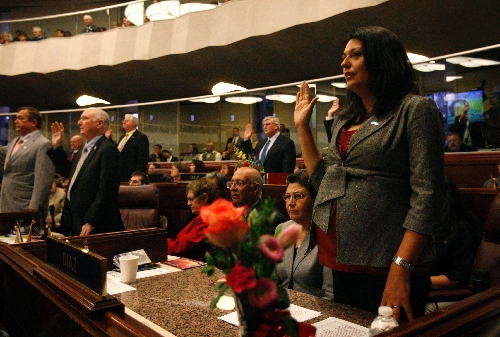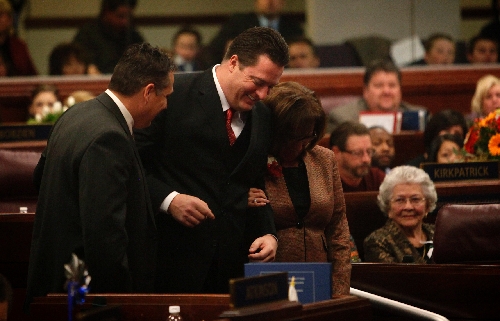Nevada Legislature opens ‘tax or ax’ session



CARSON CITY — Civility, not partisan bickering, reigned Monday as the Nevada Legislature was gaveled into its 76th session.
Republicans joined Democrats in unanimously selecting Steven Horsford, D-Las Vegas, as Senate majority leader and John Oceguera, D-Las Vegas, as Assembly speaker.
Legislators of both houses later unanimously approved a resolution in which they voluntarily cut their pay by 4.6 percent in a show of solidarity with state employees.
Then they unanimously approved spending $15 million to cover the expected costs of the 120-day legislative session.
After ceremonies in which they took the oaths of office and introduced their spouses, children, relatives and friends, legislators also introduced 129 bills in the Assembly and 132 bills in the Senate, a record number for the opening day of a legislative session.
Through the introduction of so many bills, the legislative committees can begin holding hearings to dissect those bills this morning.
Not once in the introduction speeches by Oceguera and Horsford were the words "tax increases" used, although the effort to extract more revenue from taxpayers is expected to be the biggest battle of the session.
Horsford came close at one point, saying that if legislators are to "build a bright future for the people of this state, Nevada cannot sustain $2 billion in cuts."
Gov. Brian Sandoval’s budget is $400 million short of current spending, but Horsford and others contend it does not consider reductions made in a special session last year, social service caseload growth, and the loss of federal stimulus and other funds.
But the theme of the day was how legislators can disagree while not being disagreeable.
"If the talk is not civil, no one is going to listen," said Assembly Majority Leader Marcus Conklin, D-Las Vegas. "There is an honest desire by all members to do the right thing. We can sit and listen and talk with each other. No one said we aren’t going to disagree."
Sen. James Settelmeyer, R-Minden, said civility is easy on the first day, when lawmakers are focused on ceremony, symbolism and family.
"The beginning always tends to be civil," Settelmeyer said as he walked off the floor at the end of the day. "The trick will be whether or not the end is."
That the opening of the 2011 session would be different became apparent when Assembly Minority Leader Pete Goicoechea, R-Eureka, seconded the motion to nominate Oceguera as speaker.
In the 2007 and 2009 sessions, a handful of conservative Republicans as a matter of principle refused to vote for Democrat Barbara Buckley as speaker. Their no votes made no difference because Democrats controlled the house then, as they do today with a 26-16 majority. Democrats also hold a margin in the Senate, 11-10.
Moments after he was named speaker, Oceguera called on Assembly members to "prepare for the future" by improving education, diversifying the economy and reforming the tax base.
"Do we just patch things up for another two years?" he asked in a packed Assembly chamber. "Or do we take this opportunity to be bold — to make the fundamental changes needed to move our state forward by rebuilding and investing in Nevada? I believe we must reform government; we must make lasting solutions, not quick patches."
While the nation is coming out of a recession and there are signs of economic recovery in Nevada, Oceguera warned legislators that 2011 will be a difficult session and legislators must stand to the task.
"Our work will become fodder for a future campaign mailer, a pundit’s column or an angry editorial," he said. "But it’s better to be criticized for doing our job than criticized for failure to act. None of us can afford to be timid. We will disagree, but let each member of the Assembly vote for what we know is right, not just expedient."
Goicoechea said his caucus discussed whether to vote against Oceguera but decided that "they didn’t want to start things off wrong."
As a show of the collegial spirit, Oceguera said legislators can disagree, "but we can do so as friends and colleagues."
But Goicoechea said he doesn’t see any changes to the tax structure receiving approval, particularly as the session lasts only 120 days. The Legislature will adjourn June 6 unless work cannot be finished and a special session is needed.
In the Senate, Horsford used his opening remarks to set an ambitious agenda for the session.
"My belief, however, is that this session will only be fairly judged years from now," he said. "Our children will judge it. It will be judged by their success or failure."
Horsford said he wants to use the first 30 days of the session to push through legislation he says will create as many as 5,000 jobs, mostly in construction.
The legislation, which is yet to be written, would be based on Senate Bill 5, which was approved in the 2010 special session. That bill used county tax funds to create a bond for construction projects.
Horsford said immediate jobs such as the ones created in that bill and longer-term economic development that would come from improving education are examples of what he thinks Nevada needs.
"Our state will not prosper if our children do not prosper," he said.
Horsford went out of his way to try to strike a civil tone with Sandoval, although not offering to pare back his agenda.
He said he disagreed with Sandoval and others who are proposing deep cuts to education spending.
"Some believe that the solution is to cut to the extreme, wait for the economy to recover and only then, perhaps, rebuild," Horsford said. "That theory for achieving success has been tried and disproven."
All members of both parties embraced resolutions calling for legislators to cut their salaries by 4.6 percent during the session. Members earn $8,777 per session, so they are voluntarily taking a $403.80 pay cut. The cumulative effect of all legislators taking the pay cut is $25,439.
State workers now must take an unpaid day off per month, which in effect cuts their pay by 4.6 percent.
Conklin said that the legislators’ pay cuts are "voluntary" and that lawmakers still have to sign forms with Lorne Malkiewich, administrator of the Legislative Counsel Bureau, if they want the money deducted from their pay and placed in the state general fund.
"This is an opportunity to share in the sacrifice that all of our employees and Nevadans have had to make," said Assemblyman James Ohrenschall, D-Las Vegas.
"In these tough financial times, the public employees of our state have continued to perform their duties with diligence, dedication and professionalism," added Sen. Valerie Wiener, D-Las Vegas. "We recognize that much has been asked of our state work force, and it would only be fair and right for us as legislators to tighten our belts as well."
The salaries legislators receive are not their only compensation. They also get per diem compensation and travel and office expenses. Their total pay will be about $18,000 for the session.
"We asked them to do more, and we give them less," said Sen. Mo Denis, D-Las Vegas.
The session is expected to be one of the most difficult since statehood as the parties and Sandoval are divided over how best to balance a general fund that is shrinking because of the crippling economic recession.
Some are calling the 2011 Legislature the "tax or ax" session.
Sandoval has promised to veto any tax increase bills and not to spend more than the $5.8 billion in state taxes and fees in his proposed two-year budget, a 6.4 percent reduction from current spending.
Horsford has made it clear he doesn’t think $5.8 billion is enough to adequately maintain critical services such as education and social services.
He has talked about the budget being more than 30 percent short of the need. State agencies themselves requested $8.3 billion.
Contact reporter Benjamin Spillman at bspillman@ reviewjournal.com or 702-477-3861.
Horsford speechOceguera speech












